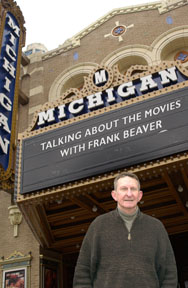
This web page is part of the Michigan Today Archive. To see this story in its original context, click here.
September 2004Culture and Politics 2004By Frank Beaver
The Passion of the Christ and Fahrenheit 9/11 represent intriguing exercises in screen culture, politics and audience response. First, why after so many charges of bigotry, undue violence and scriptural inaccuracies, did The Passion of the Christ generate such huge world-wide audiences? Of course its release at Easter-time (Ash Wednesday) was one factor in its favor. But in a day and age when word-of-mouth is the muscle in a motion picture's box-office legs, why didn't the stomach-turning violence work against the film? Maybe many expected the violence, having seen Mel Gibson's excesses in other films like the Mad Max series and Braveheart. But other reasons seem likely also. The narrative, thematic and stylistic qualities of The Passion of the Christ coalesced to create a traditionalist, conservative interpretation of the Passion. Conservative response to the film was apparently great, and conservative groups spoke out in defense of Mel Gibson who, according to news interviews, has not been particularly keen on post-Vatican II Catholicism. Gibson's interpretation of the Passion rejects any traces of the revisionism that has characterized works such as Pasolini's The Gospel According to St. Matthew (1964) and Scorsese's The Last Temptation of Christ (1988). Gibson's return to a traditionalist perspective appears now to have been a timely, audience-led calculation that caught on with the public while awakening the interest of trend-watching Hollywood producers. As an entry into the current cultural skirmishes going on in the United States, Fahrenheit 9/11 is a horse of a different but nonetheless equally fascinating color. I have friends who stick their fingers into their mouths and fake gags at the mention of Michael Moore's name. On the other hand I once saw a fire marshal attempt to close down Ann Arbor's Michigan Theater because too many people crowded into the cavernous movie palace for a question-answer session with Flint's rebellious filmmaker. Moore rankles or pleases like no other living screen documentarist. It's nothing new to say that liberals consider Fahrenheit 9/11 a significant political exposé while conservatives say that the film is just more shenanigans from a scruffy, angry little man. Dan Bartlett, the White House communications director, said Moore's film is so “false” it didn't merit comment. Michael Moore's cultural/political persona is one of curious, wide-ranging dimensions. When John Kerry referred in a speech to the seven-minute unresponsiveness by George W. Bush after learning of the 9/11 attacks while visiting a Florida elementary school, some news analysts quickly questioned Kerry's comments because he might have taken his cue from Michael Moore's inclusion of the incident in Fahrenheit 9/11. The suggestion by news commentators was that the incident had become tainted by Michael Moore and therefore not worthy of further consideration in political arenas. And, knowing how Moore stirs controversy, millions of other folks might have felt the same way. The significance of Fahrenheit 9/11 and The Passion of the Christ is that the former offers clues about the degree to which culture seems to be shaping current politics, and the latter about the way politics seems to be shaping contemporary culture.
|
|
Michigan Today News-e is a monthly electronic publication for alumni
and friends. |
| MToday NewsE | |||
|
Michigan Today
online alumni magazine
University Record
faculty & staff newspaper
MGoBlue
athletics
News Service
U-M news
Photo Services
U-M photography
University of Michigan
gateway
|
• Maps |

 Film historian and critic
Film historian and critic 